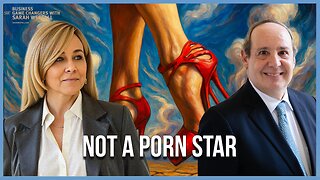Premium Only Content

At least coffee #77, or Planned poverty as planned by the EU
The Fiala's government has committed one of the worst betrayals of the Czech Republic's citizens. Instead of protecting the pockets of those who voted for it or are at least forced to tolerate it, it helped push through a completely destructive and nonsensical project called "ETS2 (EU Emissions Trading System EU ETS) Permits."
About the ETS2 system: As part of the revision of the ETS Directive of 2023, a new emissions trading system called ETS2 was created. Independent of the existing EU Emissions Trading System (EU ETS), this new system will cover and address CO2 emissions from fuel combustion in buildings, road transport, and other sectors (particularly small industries not covered by the existing EU ETS). This permit system will increase the cost of living for everyone, regardless of income. In economics, as we know, everything is connected to everything else, so any increase in fuel prices will immediately increase the cost of everything that depends on transport. And because everything depends on it directly or indirectly, wherever you look, i.e., food, other energy sources, clothing, and everything else, there will be nothing that can avoid this price increase.
The ETS2 system complements other Green Deal policies in the sectors covered and is intended to help Member States achieve their emission reduction targets under the Effort Sharing Regulation. Emissions reductions in these sectors have not yet been sufficient to put the EU on a solid path to achieving its climate neutrality goal by 2050. The carbon price set by ETS2 will provide a market incentive for investment in building renovations and low-emission mobility.
The ETS2 system is expected to be fully operational in 2027. Although it is intended to be a cap-and-trade system like the existing EU ETS, the ETS2 system will cover emissions in the upstream part of the supply chain. Fuel suppliers, rather than end consumers such as households or car users, will have to monitor and report their emissions. These entities will be regulated under the ETS2 system, which means they will have to retire enough allowances to cover their emissions. Regulated entities will purchase these allowances at auctions. The ETS2 cap will be set to reduce emissions by 42% by 2030 compared to 2005 levels. Except that the cap is just a pipe dream of the creators of this nonsense. Even the existing ETS system, which is traded on exchanges, has long since failed to meet any cap requirements.
All emission allowances in the ETS2 system will be auctioned. Member States will have to use revenues from the ETS2 system for climate and social measures and will report on how this money is spent. Part of the revenues will be used to support vulnerable households and micro-enterprises through a special Social Fund for Climate Action. The ETS2 legislative framework is set out in the ETS Directive. So, on the one hand, these allowances will cost us money, but on the other hand, they will contribute to measures that often don't make sense but are considered beneficial by experts. Every builder knows that there are certain buildings that simply cannot be insulated. These are mainly houses that are more than a hundred years old and have already been renovated by their owners to meet current standards. So the interior fittings are more in line with the present than with the time of their construction.
This is where two conflicting regulations will intersect: the implementing guidelines for ETS2 and the EPBD IV directive. While the Social Fund under ETS2 will push for building renovations, under EPBD IV it will be up to individual governments to decide how they view their country's history and architectural heritage.
And to ensure that the impoverishment of the population is not threatened, a carbon tax is being introduced under the CBAM (Carbon Border Adjustment Mechanism). CBAM is an EU tool for setting a fair price for carbon emitted in the production of carbon-intensive goods entering the EU and for promoting cleaner industrial production in countries outside the EU.
The CBAM system will apply in its final form from 2026, with a transitional phase from 2023 to 2025. This gradual introduction is in line with the phasing out of free allowances under the EU Emissions Trading System (ETS) to support the decarbonization of EU industry.
You can imagine how non-EU suppliers will react. Qatar, for example, has already said so openly. If the EU really wants to impose a tax on gas from Qatar, the country will find another buyer. And it will have no problem doing so. European citizens will simply discover that poverty will not only affect transport and energy. It will also mean that there will be a shortage of goods, as non-EU manufacturers will prefer to sell them where such nonsense does not apply. The result will be not only decarbonization but also the dismantling of EU industry. And the cycle of impoverishment will continue to spin. So there is only one way out. Disband the EU Commission and the EU Parliament, or possibly dissolve the whole rotten union. And start building relationships on a different principle.
-
![[Ep 801] Dems Setup & Disgusting Response to DC Tragedy | Giving Thanks With Rush](https://1a-1791.com/video/fwe2/79/s8/1/2/t/F/D/2tFDz.0kob-small-Ep-801-Dems-Setup-and-Disgu.jpg) LIVE
LIVE
The Nunn Report - w/ Dan Nunn
3 hours ago[Ep 801] Dems Setup & Disgusting Response to DC Tragedy | Giving Thanks With Rush
98 watching -
 20:23
20:23
Neil McCoy-Ward
5 hours ago🚨 She Wasn’t Ready for This (TOTAL PUBLIC HUMILIATION!)
16.1K12 -
 18:46
18:46
ThinkStory
1 day agoIT: WELCOME TO DERRY Episode 5 Breakdown, Theories, & Details You Missed!
19.1K -
 2:23:05
2:23:05
Badlands Media
13 hours agoBadlands Daily – Nov. 27, 2025
120K39 -
 6:20:00
6:20:00
FusedAegisTV
8 hours agoFUSEDAEGIS | They Put A Freakin' Blue Mage In THIS | Expedition 33 PART V
43K -
 1:16:04
1:16:04
Rebel News
5 hours agoHealth-care collapsing, Bloc says Quebec sends Alberta $, US Ambassador's advice | Rebel Roundup
26.8K24 -
 1:44:03
1:44:03
The Shannon Joy Show
6 hours agoThe BEST Of Shannon Joy 2025! Special Thanksgiving Holiday Compilation
29.7K -
 1:07:25
1:07:25
Sarah Westall
21 hours agoSarah Westall is Not a Porn Star – Conversation w/ Stuart Brotman
21.5K15 -
 2:59:36
2:59:36
Wendy Bell Radio
13 hours agoPoint Blank Hate
91.3K115 -
 4:56:43
4:56:43
MrR4ger
11 hours agoWARLOCK SOLO SELF FOUND HARDCORE - D4RK AND D4RKER HAPPY TURKEY DAY RUMBLEFAM
26.4K1